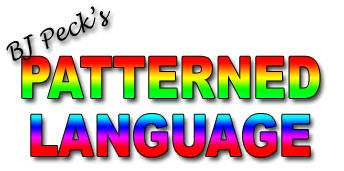 |
||||||||
 |
||||||||
 |
 |
|||||||
|
|
|||||||||||||||||||||||||||||||||||
| History of Patterned Language | |
| Patterned Language is the product of 25 years of creative work by Mr. B.J. Peck, former Director of the Oregon State School for the Deaf and past President of the Conference of Educational Administrators Serving the Deaf. The groundwork was laid during his first four years at O.S.S.D as a classroom teacher. He sought to develop a new, completely comprehensive program of teaching written language skill to the deaf pupils. The program utilizes color coding of basic syntactical structure. This provides the visual means of internalizing the unspoken rules of language that hearing persons gain by age five through the ear gate. | |
| During Mr. Peck's years as Assistant Director, Patterned Language was fist tried experimentally in different levels of the school, then implemented school wide. Classroom teachers gave much feedback to Mr. Peak which led to refinement of the program. The teacher manuals were developed in loose-leaf format to expedite continual revision and improvement. | |
| A psycholinguist, George Allen, Ph.D., spent one year in research at O.S.S.D. On the effect of the use of Patterned Language. This was completed in May of 1971 with grades 4 through 12. Every grade scored higher on the Stuckless PLAID test than national norms for deaf students. | |
| In 1982, Mr. Peck chose GMD to publish an Oregon nonprofit corporation of certified teachers of the deaf to publish and distribute Patterned Language. These teachers have 47 year of combined experience using Patterned Language in their classrooms. Since 1973, they have made numerous trips to share Patterned Language with schools for the deaf on four continents. | |
| What Patterned Language will do | |
| It is designed to help the learner develop the ability to function properly with the printed word symbol system as he/she acquires the ability to write English language sentence patterns. | |
| Patterned Language limits the vocabulary in Units I and II to meaningful, need-based words. This vocabulary is then manipulated, in Unit III, into all basic simple sentences. The KEY is what you CAN DO . . .with the number of words you have, not how many words you have. Expressive connected language utilizing these printed words results from this approach. | |
| What Patterned Language is not designed to do | |
| 1. It is not grammar skills oriented, even though some grammar concepts can be learned incidentally or can be purposely taught. | |
| 2. It is not composition oriented. It does not take the learner into paragraphing, although innovative persons can build into paragraphing skills from Patterned Language. | |
| 3. Patterned Language is not a curriculum. It is a program system into which any curriculum content can be inserted. This is a strong plus since many schools have their own curriculum content. | |
| For more information contact Naomi Pfnister | |
| Get your Patterned Language Order Forms and Training Programs here (under construction) | |

